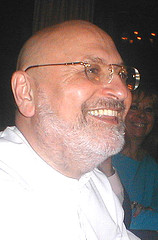Re Ian Bremmer 'Could third-party candidates upend the 2024 US election?' 3 April The current political movement in the USA…
Wednesday Night #1066 – The Convocation
Written by Diana Thebaud Nicholson // August 7, 2002 // Herb Bercovitz, Jacques Clément, Reports, Special Wednesdays // Comments Off on Wednesday Night #1066 – The Convocation
# 1066 (and all that)

Peter 1 of Prestwich (Peter the bald) Lord High Admiral RCN
(Usurper of Count David Of Westmount’s fiefdom)
You my loyal (and any disloyal) Courtiers are hereby commanded to attend The Court to be held on Wednesday 7th August 2002 AD at the Castle of Count David of Westmount, to celebrate evening # 1066 that also coincides with and our glorious Norman victory over the Anglo Saxon soccer hooligans. Count David (The Pious) and his Chatelaine Diana (The Patient) are still on their pilgrimage in the east and I thus declare myself Chair and will continue to usurp and pillage their castle and fiefdom. I do thus declare an open court for the celebration of # 1066. Come one come all for a fun and enchanting evening.
Only those courtiers on approved quests, dragon slaying, saving of damsels or knights in distress, crusades and pilgrimages are excused. Applications for absent approval passes for the above reasons are to be submitted by email.
Dress code “Casual Chic Medieval” (anyone coming as a monk is NOT to have a dirty habit!). Dress the part, or bring a show and tell object.
ØCome help decide the fate of Sir John Curtin who is on trial for witchcraft (Lord preserve and guard us Amen). The charge; “He doth trap persons in a black box with a magic eye, that according to his secret papers he calls a camera. He then throws the unfortunate trapped persons so hard against a white sheet that they become flattened”. Do your duty and assist in extracting from him the information about whom next he will be trapping. Help ensure a fair trial before we condemn him to be burnt at the stake we have erected on the lawn.
ØThe Chancellor of the Exchequer Jacques Cardinal Clément will report on the realm’s financial woes. Help with ideas on how we may continue to increases taxes on the villains and peasants and further ways we, the government, can squander the proceeds.
ØA possible visit from Doctor Chil Heward the famous Alchemist who, using the new invention called “The Stock Market” will help us change dross into gold (or is it the other way round).
ØHear the number one in the charts, latest Gregorianchant that is taking the Western world by storm, extracts from the latest red hot CD Monophonia Noctus-Anima fundi to be sung by the Usurper himself.
ØWe expect a visit by The Pretender to the City State OfThe One City One Island Of Montréal, the Doge Pierre Of Bourke to plead his case before us.
ØWe hope the exiled High Sheriff Of Westmount, Sir Peter Of Trent, will sneak in for a draught. The gossip is that he is shortly to be declared “Out law” by the wicked witch Harel.
ØCome judge the legal battle between The Abbess Roslyn (formerly called the Fair before taking the veil and renouncing the profane for the sacred) and Friar Brother Beryl (formerly Prince Beryl of Polska). Fra Beryl claims that the Abbess’ refusal to permit him entrance to the convent is discriminatory and against the Magna Carta Charter. Quote of the learned Fra: “After all, I wear a skirt just like her!”
…….. And lots more. So come put the Medieval Evil year 50th of our Sovereign and liege Queen reign to rights and solve all the problems before D & D return.
Best Regards from your loving Tyrant,
Peter The Ferst
Introduction
The guests assembled in medieval garb to commemorate the Norman conquest of Britain, led by William the Conqueror (also known as William the Bastard) in order to avenge an unkept promise, as well as its relevance to the world today. With William replacing Harold II, came the abolition of slavery in England as well the elimination of the death penalty (although castration and blinding remained accepted forms of punishment).
The rise of facism
The British tradition of the rights of the individual overriding those of the state, transmitted, as well, to former British colonies, include the presumption of innocence before the courts. The unsettling rise of fascism in Europe may very well be made possible by the non-acceptance of this principle. One factor of course, is the mobility of citizens within the European union, but it is also the result of immigration of eastern workers required when the economy was booming, who are an easy target to blame for the economic slowdown. In any case, the threat of rising fascism in Europe is very real and frightening.
Same-sex marriage
There has been much debate on civil union and marriage of same-sex couples. Traditionally, marriage must be between partners of opposite sex and children should have role models of both sexes. However, much has changed over the last half century. Women no longer stay at home but are rapidly gaining equality with men in the workforce. A large percentage of births are to single mothers and single adoptions are on the rise.
While a large number of people remain opposed to homosexuality, it has been rapidly gaining acceptance within society. The question remains as to whether marriage remains part of a religious practice and if so, whether the separation of Church and State or the Trudeau doctrine of non-intervention of the State in the bedrooms of the nation apply. However, few who maintain the latter position would truly object to the U.S. government’s intervention in Utah, overriding that state’s permissiveness in the issue of polygamy. If, on the other hand, benefits are the principle issue in marriages between same-sex couples, that may shortly be resolved with the implementation of guaranteed minimum income legislation, ultimately to be passed in Canada.
Financial statements
It appears that very few CEOs in the United States will meet the deadline for signing off on financial statements (see Jacques Clément’s analysis below), largely because of the difficulty of collating much information on short notice from world-wide subsidiaries and the sudden overburdening of U.S. accounting firms. Some believe that more important than this initiative is the impact on the stock market of before and after hours trading from which the individual investor is barred. It is pointed out, however, that with markets open around the world, the prohibition becomes meaningless.
Jacques Clément’s Analysis:
S.E.C. AUGUST 14th DEADLINE:
The S.E.C.’s request to the CEOs and CFOs of the nine hundred and forty-seven largest U.S. corporations of signing their financial statements under oath could have significant impact on financial markets next week, given that only twenty-five of them have responded so far, with one week to go and given the comments of General Electric’s CEO that “one hundred companies will see it impossible to sign, given among other things, their pension funds’ assumptions and other impediments.”
The Dow-Jones has given back two hundred and eighty points of the last seven days of July’s one thousand point recovery, in the face of continuing corporate scandals, the Middle East conflict, the financial crisis in Latin America, the significant slowing pace of the U.S. recovery and the talk about invading Iraq. The market will remain fragile and volatile in the coming weeks, given the uncertainties about the U.S. economic outlook, the loss of wealth (three trillion dollars since mid-May), the very tight credit conditions for the corporate sector and the still expensive state of the stock market.
THE U.S. ECONOMY:
With 1.1% growth in the second quarter, GDP and negative final sales, there are signs of renewed weakness in the June-July housing sector, manufacturing data, services reaching a six month low, exports, wholesale and employment. Only six thousand new jobs were created in July. Consumer sentiment has eroded substantially and is at its lowest since the mid ‘90s. Leading indicators were flat in June and the trade deficit reached a near record of almost thirty-eight billion, with 6.5% rise in imports in the last two months published.
Business investments remain sluggish. Many analysts and strategists expect the effect of the erosion of wealth will lead the U.S. economy into another recession, but Jacques would give it no more than a forty percent chance at the moment, given continuing strength in personal income and assumption of likely strength of retail sales for July, record auto sales (annual rate 17.9 million, volume +10%), increased net government spending, the lean manufacturing inventory with early signs of rebuilding and the degree of monetary stimulation already in place. He expects the Federal Reserve to leave their overnight rate unchanged at 1¾% when they meet August 13 but they are likely to announce “an easing bias.” Low inflation coupled with low energy prices, will remain very positive for the economy but growth will have to be revised down to approximately 2% in the second half with potentially one negative quarter, starting with the second quarter. Federal Reserve should be easing by ¼% at each of the three meetings starting in September, for an overnight rate of 1% by year end.
CANADIAN ECONOMY:
Looking at the flat May GDP number, negative retail sales, declines in auto sales and wholesale, in shipments of autos -7.5%, in manufacturing investments and production (autos, down 9%), inventory liquidation, sluggish business fixed investments and the 2% decline in exports are indications that the economy is showing signs of fatigue. Housing starts and non-residential construction declined in June, with the third consecutive quarterly business decline. Business confidence is at its lowest level in five years (minus thirteen points in June-July) and the Ivey Purchasing Managers’ Survey were flat in June. The Bank of Canada is likely to stay neutral at its September 4 meeting, with the overnight rate at 2¾%. With the weaker U.S. economic outlook, exports to the U.S. will decelerate, capital investments will remain weak, consumption and the service sector will decelerate, but the residential sector will recover, thanks to a renewed decline in mortgage rates. Second quarter GDP is likely to be at 3% to 3½% annual rate and the second half of the year at a 2% to 3% pace .



